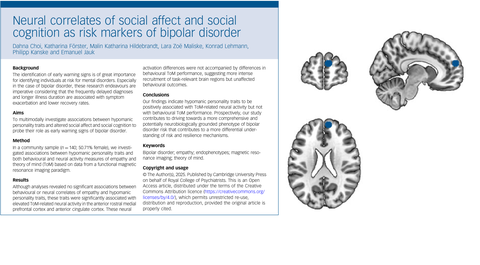May 02, 2025
Is an elevated risk for bipolar disorder associated with aberrations in social affect and cognition?
In bipolar disorder, research on early warning signs is of great importance considering that the frequently delayed diagnoses are associated with symptom exacerbation and lower recovery rates. In collaboration with Emanuel Jauk (Medical University of Graz), we addressed this matter by exploring socio-affective and cognitive correlates of bipolar disorder risk. Specifically, we investigated whether individuals with higher levels of hypomanic personality traits—considered an indicator of elevated bipolar disorder risk—exhibit atypical empathy or theory of mind (ToM) at the behavioral or neural level.
Our results revealed that individuals with higher hypomanic traits showed increased frontal brain activity during ToM demands, despite no observable behavioral differences. Potentially, at-risk individuals may require greater neural resources to achieve comparable performance. These findings offer valuable insight into social processing mechanisms during the early subclinical stages of bipolar disorder.
For more details, check out the full publication in The British Journal of Psychiatry
Choi, D., Förster, K., Hildebrandt, M. K., Maliske, L. Z., Lehmann, K., Kanske, P., & Jauk, E. (2025). Neural correlates of social affect and social cognition as risk markers of bipolar disorder. The British Journal of Psychiatry, 1–7. doi:10.1192/bjp.2024.282

